It was the tiniest of gestures that would have gone unnoticed were it not for the eagle-eyed vigilance of Tom Shanklin. In the aftermath of the Scarlets’ victory over a Springbok-laden Sharks, Dwayne Peel indulged in the most undemonstrative of celebrations. A sly wink, and a barely perceptible jutting of the jaw. The subtlest of movements that would have escaped the notice of most. But Shanklin – one of Peel’s closest mates – is an incessant chronicler of life’s otherwise unseen vignettes. The kind of man who keeps a cache of embarrassing photos on his phone to be deployed at strategic moments to maximum effect – birthdays, stag dos, anniversaries. Within moments, the Peel celebration had been converted, courtesy of Shanks, into a gif and dropped into the Twittersphere where it went on to receive more than 100,000 views. In many ways, it marked a pivotal moment in the evolution of this Scarlets side.
During the first half of the season, Dwayne Peel looked broken, his body language that of a condemned man as defeat followed defeat, and any prospect of salvation seemed slim. Heading back to take charge of his hometown club would have felt like a dream gig, but it had rapidly turned into a nightmare. As 2022 came to an end, their league record made for grisly reading. One victory from ten in the United Rugby Championship, combined with a lamentable disciplinary record that saw red and yellow cards being tossed around like confetti. Peel’s prodigal son status may have bought him some patience with the Parc y Scarlets faithful, but the portents were looking grim.
Then, the revival. 2023 dawned and the Scarlets’ sloughed off their old skin, emerging into the new year a sharper, steelier, and smarter outfit. Gone were the hesitancy and stooped shoulders of the opening half of the season, to be replaced by a genuine swagger and confidence. It began with a backs-to-the-wall victory against the Dragons on New Years’ Day, during which they recovered from the first half sending off of Sione Kalamanfoni to record a handsome win. Further victories followed against Cardiff, the Cheetahs and Bayonne, before an impressive dismantling of the Vodacom Bulls. That night, the Scarlets put paid to the myth that Welsh teams were unable to cope with the physical might of the South Africans, as successive lineout drives were sacked, and the home side clattered into every contact with a berserker-like intensity. It was a statement win. By the time February rolled around, the Scarlets had completed doubles over the Cheetahs and Bayonne to return a perfect record in the pool stages of the Challenge Cup.
The transformation may have been baffling to casual observers, but according to the club’s defensive guru Gareth Williams, there was no Eureka moment or late-night epiphany. Just a stubborn conviction that they were travelling in the right direction, and would eventually navigate their way through the thicket of disappointment and defeat, and emerge on to the clear path to victory.‘We kept a lot of faith in certain areas’ he explains, ‘and tried to keep the messages consistent. Those elements have evolved and developed and the whole game has just linked up pretty well.’ It’s a pretty dispassionate viewpoint, which doesn’t reveal the amount of emotional hand-wringing that must have been going on behind the scenes, but it’s a reflection that good coaching is more about keeping faith and holding the line, rather than panicking when the wind changes direction. ‘From a defence point of view’ he continues, ‘a lot of my reviews from back in September are exactly the same as they were post-Sharks. Those things we’ve been trying to implement all season, we’ve just got better at.’
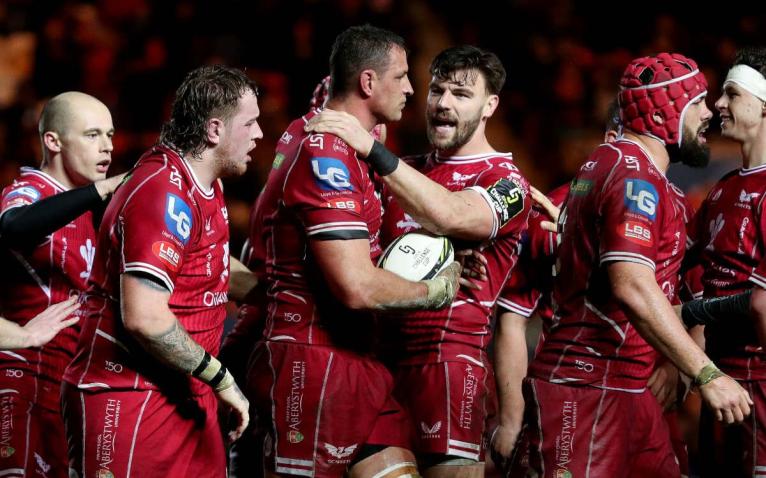
Also significant was the arrival of two new coaches in October in the shape of Lee Blackett and Scott Sneddon. Prior to that, Peel, in his first head coaching role, had been frantically spinning plates, spreading himself too thinly, and balancing his schedule between actual coaching, and managing the fallout of Welsh rugby’s crippling financial crisis. With budgets shrinking, and livelihoods disappearing, his role became infinitely more challenging. When Blackett and Sneddon arrived as reinforcements, it helped him spread the load. ‘Those two appointments completed us as a coaching team’ Williams affirms, ‘and that’s shown in how all those areas have now linked together. Those appointments allowed Peely to “head coach” fully from that point of view, but a lot of the messaging has been pretty consistent (from the start) and now it’s come to fruition.’
Speak to anyone involved at the Scarlets about their rapid upward trajectory, and it’s not long before Lee Blackett’s name comes up. The former Wasps head coach found himself unemployed after his club went into administration, and salvation arrived in a message from Peel. ‘Peely deserves a lot of credit for approaching Lee and bringing him in’ says Williams. ‘Lee’s pedigree as head coach at Wasps was excellent and the easy thing for Peely to have done would have been to avoid that. But that’s strong leadership from Dwayne because Lee’s added massively to us.’ Good leaders are those who give free rein to their colleagues, and that’s what Peel has done. Rather than feel threatened by someone who’s used to being in charge, he’s tapped into that deep well of rugby knowledge, and the benefits are plain to see. The Scarlets’ attack has looked sharper, more inventive and more clinical since Blackett’s arrival. Running lines are crisper, passes more sweetly-timed, and ruck ball has been far more rapid. But one of the key areas has been the emphasis on kicking. Blackett has hammered home the importance of accurate, contestable kicks, and the equal importance of the chase.
Steff Evans, a purported favourite of Blackett’s, is enjoying something of a renaissance of late, quietly becoming the top Welsh try-scorer of all time in the URC.
‘That’s something that’s being driven’ confirms Williams. ‘A big part of that is the kick quality. That helps massively, and feeds into our strategy of wanting to contest for possession because we transition so well in attack when we turn the ball over.’ Wayne Pivac’s title-winning Scarlets sides had a similar mentality, but their strategy was based on winning breakdown turnovers on the floor. With a legion of world-class jackallers in his side like Barclay, Beirne and James Davies it made sense to play to those strengths. Blackett and company are coming at it from a slightly different angle, using super-fit flyers like Steff Evans and Gareth Davies to sprint relentlessly after every kick, pressuring the opposition into surrendering possession or exiting badly. It’s not as sexy as launching complicated strike plays from first phase, but it’s mightily effective. Steff Evans, a purported favourite of Blackett’s, is enjoying something of a renaissance of late, quietly becoming the top Welsh try-scorer of all time in the URC.
His teammate, Johnny Williams – who’s recently returned from an injury layoff with what appear to be supernatural powers – has been impressed with Blackett’s optimistic approach. ‘He bigs boys up by accentuating the positives, rather than calling them out for mistakes’ he explains. ‘We’ve got targets to hit for our kick-chases, and in the team meeting, he’ll show a slide with pictures of all those boys who’ve exceeded those targets. If you haven’t done it, you feel like you’re missing out. You want to be up there on the board in front of your teammates. It makes you work harder in a positive way, as opposed to coaching through fear.’
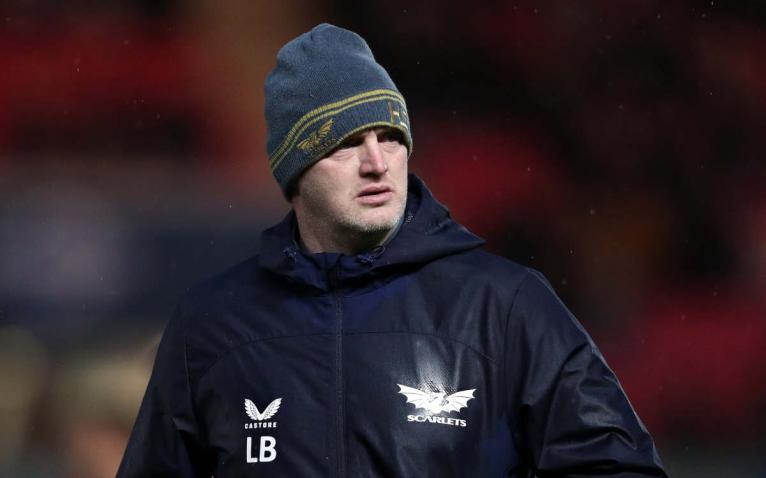
‘A lot of people forget that a coaching team is exactly that – a team’ says Gareth Williams. ‘It’s really important to be able to bounce things off each other. I have a defensive focus and Lee has an attack focus, but we’re constantly discussing things and it’s great to be able to have that sort of experience. I think we’ve worked well as a team, and that includes the crossover with Ben Franks (forwards) and Emyr Phillips (contact area). Lee’s experience has been integral to that.’
Detail is the key word. Blackett has a beady-eyed forensic focus, and an ability to swiftly dissect a player’s strengths and weaknesses. ‘He’s picked me up on really tiny bits of movement, on running lines and bad habits’ Johnny Williams explains. ‘As an example; turning a corner and straightening up. He’s quite hot on that. As I’m getting the ball, if I’m having to come onto it a bit of an angle, to drift to receive the ball, I’d have a tendency to keep running that arc. He’s coached me on the importance of switching direction: north to south, turn the corner.’
These aren’t mind-blowing revelations but subtle tweaks that can make a big difference. Running north-south when receiving the ball might mean the difference between making a line-break or not, beating a tackler, or getting dragged to the floor. On such subtleties outcomes can turn. The critical 1%s we hear about so often.
Sam Lousi and Vaea Fifita have both been in sensational form and when unleashed as a duo, they’re nigh-on irresistible. Both are strong and abrasive lock forwards, but both are as dexterous, skilful, and elusive as any back.
There’s clearly an easy relationship between the coaches, with robust debate encouraged. Humour is rarely far from the surface, with Gareth Williams suggesting Blackett had an ulterior motive coming to Carmarthenshire, ‘I pull his leg saying he’s probably just here trying to recruit some boys from Wales!’ he chuckles, before heaping further praise on his newest colleague: ‘He interacts so well with the boys and is able to have good discussions around the detail needed from our forwards, how they attack and how they approach their facets of the attacking game, and that detail around first-phase play with the backs. He’s been fantastic and you can see the experience he’s had as a head coach has really helped us. He’s seen this as a real opportunity to work in a different league. He’s very personable, and his introduction has been quite seamless.’
What’s also helped has been the presence of two players who’ve blossomed into genuine world-class performers. Sam Lousi and Vaea Fifita have both been in sensational form and when they’re unleashed as a duo, they’re nigh-on irresistible. Both are strong and abrasive lock forwards, but both are as dexterous, skilful, and elusive as any back. Fifita’s outrageous solo try against Brive was just one among many additions to his gasp-inducing showreel this season.
Fifita was arguably the canary in the coal mine for Wasps’ financial collapse. The former All Black was less than a year into his contract with the Coventry outfit when the Scarlets swooped to claim him. It was a confounding move, and a rare instance of a Welsh region being able to offer a more lucrative deal to a marquee player, but his departure offered a hint of what was to come for Wasps. From that perspective, it’s been a happy reunion between Blackett and his erstwhile star signing. Fifita and Lousi have already attained cult status down west.
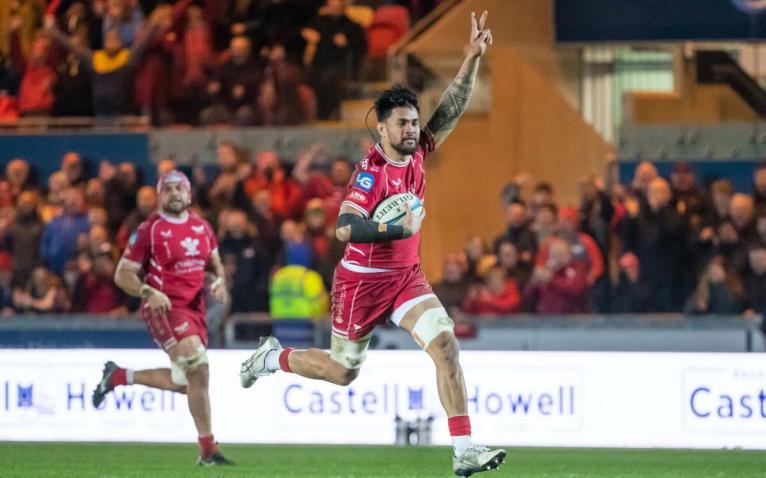
‘As a partnership they’re fantastic’ says Williams of his superstar charges. ‘Some of the things Sam Lousi does leaves me in awe. There was one example against the Sharks where they threw the ball into the lineout. It went over the 15-metre line and he came around to their side and stole the maul before it was set. His smartness as a rugby player is exceptional. He’s constantly looking for opportunities; we see the pressure he puts on the nine with his smartness, but he’s very aware of the law around the ruck.’ That’s something that Williams is keen to stress. When players like these are in full flow, it’s easy to assume they’re acting entirely on instinct, relying on innate ability rather than a more scholarly understanding of the game.
Not so, according to Williams. While they both have talent in abundance, it’s their commitment to learning and improving that elevates them above the rest. ‘A lot of Vaea’s work speaks for itself. That try against Brive was just exceptional athleticism, but also an awareness about the picture that was in front of him at that ruck, so again; really good game knowledge, as well as that athleticism to finish it.’
Fifita is so unwilling to embrace the limelight, that he recently charged half the length of the field for a wonder try against Edinburgh, only to pop the ball to Gareth Davies when he was already over the try line.
Both are Tongan-born and are now international stable mates after Fifita switched allegiance from New Zealand, and like a lot of their Pacific-island brethren, they’re incredibly humble and almost painfully shy. Their natural inclination to avoid the spotlight is at odds with the fact they’re constantly bathing in its afterglow. Rare is the fixture in which one or other of them isn’t a contender for man of the match. There’s something wholesome and endearing about their constant deflection of attention, and their fumbling acceptance of praise under the glare of the TV cameras. Fifita is so unwilling to embrace the limelight, that he recently charged half the length of the field for a wonder try against Edinburgh, only to pop the ball to Gareth Davies when he was already over the try line.
The main challenge the likes of Williams has with players like these is not to overload them with information. ‘It’s really interesting’ he says, ‘that inherent ability they have to identify opportunities and take advantage of them. Not often you do come across players in that sense, and you’ve just got to let those boys flourish. These are conversations we’re having constantly– that avoidance of over-coaching. A lot of the players can work things out by themselves and it’s about giving them those opportunities to explore those decisions. We’re fortunate that we’re seeing those coming out in game scenarios at the moment, and when you’ve got players of that quality, you just have to trust them to go for it.’
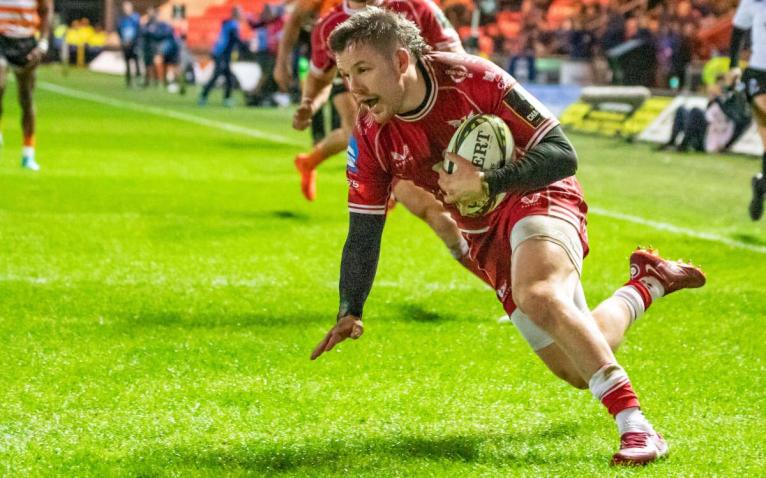
Speaking of trust, that’s something that’s there in abundance between Williams and Peel, given how far back their relationship goes. Both are natives of Tumble, a small village near Llanelli. They were a year apart at Ysgol Gyfun Maes Yr Yrfa and went on to play in the same club team at Tumble RFC. ‘Obviously, Dwayne went on to have an unbelievable playing career and we weren’t in regular contact when he went up to Sale and then over to Bristol and Ulster’ says Williams. ‘But we’re very much from the same upbringing, played for the same club, and the same school team coming through. With those types of relationships, it’s easy to pick up where we left off when we’re in each other’s company. We kept in touch over the years, and when Dwayne got in touch it was an easy decision’ he explains.
At the time, Williams was part of Wayne Pivac’s Wales coaching team. His final act there was to help mastermind a first ever win on South African soil, and given what’s happened since, you might think he left at exactly the right time. The opportunity to work with his childhood friend in his home region proved far too tempting to resist.
Williams had been the contact area specialist under Pivac, but is in charge of defence at the Scarlets where – with the exception of the free-scoring Munster game at the beginning of March – things have tightened up considerably. Williams sees switching from test rugby to club rugby, not as a demotion, but as the next entry on an increasingly burnished CV. ‘I loved international rugby, and I loved coaching Wales, but I’ve also coached on the Sevens series and at the Olympics before moving onto the U20s, and I felt that having experience at URC level would stretch me a bit more and help my understanding of that level of coaching and playing, what challenges those international players I worked with faced, as well as the technical and tactical elements of the URC. It felt like the right time.’
The so-called Scarlets Way means the supporters not only want to see their side win, they want to be entertained as well.
The Scarlets are getting ready to celebrate their 150th anniversary. A poignant milestone given the ongoing uncertainty in Welsh rugby, and the ever-present clamour about cutting or merging regions. A century and a half is a long time for this club in rural west Wales to have survived the buffeting winds of societal change and the more recent demands of professional rugby. But survive they have, and if there’s one thing that’s defined their identity throughout, it’s a kind of swashbuckling, adventurous approach to the oval ball game, personified over the years by the likes of Phil Bennett, Ieuan Evans and more recently, Vaea Fifita. The so-called Scarlets Way means the supporters not only want to see their side win, they want to be entertained as well.
Do Williams and his colleagues feel the pressure to live up to that? Chuckling, he admits that there’s a real desire for the Scarlets Way to ‘shine out’, but tempers that with a warning that ‘a foundation of grit’ needs to be in place for the attack-minded approach to flourish. ‘We’ve got to have a real grit about us, and that’s something that, defensively, I’m really keen to drive. From that the attacking rugby can come. A lot of the time the most attractive rugby to watch is just about being clinical, making really good decisions, running really good lines and timing the pass really well. Ben Franks is driving that set-piece element, and Emyr Phillips’ work in the contact area is vital for that to be able to flourish. I don’t necessarily feel the pressure of it, but I’m very aware of the tradition and it’s something I’d like to keep going.’
There is much to be positive about at the Scarlets right now, notwithstanding the general sense of malaise in Welsh rugby. Williams admits he’s been a counsellor as much as a coach in recent months, what with all the uncertainty that players are having to deal with. ‘We’re not just coaching players, we’re coaching people’ he says, ‘and it’s all very well saying leave your issues at the front door, but that’s not how life works. You’ve got to have that empathy even though you’re trying to drive things to a high standard. We’ve got to have empathy as to what their situations are, what the landscape of Welsh rugby has been, and trying to support them while also preparing for high performance rugby.’
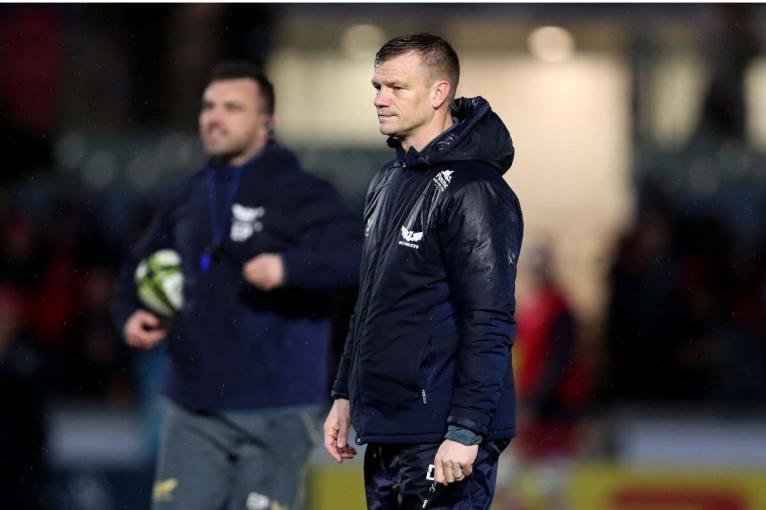
That separation between on field and off field concerns is something Johnny Williams has sought to address this season with the help of the mindset coach, Oliver Olds. ‘I try to play now with as little anxiety as possible’ he says, linking his current surge in form to a mental refresh. ‘The more I have going through my head when I’m playing; outside factors, injuries, anything like that, the more likely I am to go into my shell and play with fear. I’ve come across this word recently – “nonchalant” – which has become my buzz word. When I play, I try to be as chilled, as relaxed, and as nonchalant as possible. That comes from getting my prep right in the week, and not over-thinking things.’
In the past he admits, he’d allow the pressure and anxiety to dominate his thoughts, and he’d been in danger of falling out of love with the sport. ‘I’d find myself counting down the minutes until the end of a game, but since I’ve come back from injury, I’ve found myself enjoying it much more, wanting to get on the ball, and wanting to make big tackles. Mentally, the injury made me rethink things, I’m really grateful to be able to do this for a living. I used to struggle with “taking the shirt off” when I went home, but now I can be relaxed and not think about rugby. Or if I drop a ball in training, I’m able to let it go. It’s taken me a lot of practice to get to that point.’
For now it’s about Clermont in the last eight of the Challenge Cup; a club that could arguably be twinned with the Scarlets given the crossover of players in recent years. Jonathan Davies, Lee Byrne, Regan King and Stephen Jones have all worn both jerseys.
Johnny and Gareth Williams are definitely glass half-full kind of guys, but I wonder if there’s an element of regret that things didn’t click into place earlier. Had the opening half of the season not been so disastrous, the Scarlets could be mounting a credible title charge right now. Does Gareth wonder what might have been? ‘For sure’ he replies, ‘but I’m not sure regret is the right word, it’s more trying to get an understanding of why we took so long to get to where we are right now. You look at first game of season (against the Ospreys); we drew that with the last kick of the game. You keep asking yourself, if we’d won that game – and we probably should have – would that have kicked us on differently? Would we have progressed that little bit sooner? but those are all “what ifs” and “who knows”, aren’t they? This is why getting into that European quarter-final is so exciting, it keeps us alive in that competition. We’re very aware that it’s knockout rugby again, and if we slip up we’re out. We want to be challenging for silverware whatever competitions we’re in. There’s a regret that we’re not in that phase in the URC, but also an understanding that we’ve got to learn our lessons, and move forward into next season in the position we’re currently in.’
For now, though, it’s about Clermont in the last eight of the Challenge Cup; a club that could arguably be twinned with the Scarlets given the crossover of players in recent years. Jonathan Davies, Lee Byrne, Regan King and Stephen Jones have all worn both jerseys. And if the Scarlets have Fifita and co to quicken the pulse of the expectant fans, Clermont have possibly the most predatory finisher in World Rugby. Clermont travelled to Bristol as underdogs last week, but left Ashton Gate as victors thanks to the jaw-dropping brilliance of Damian Penaud. The kind of winger who can find space where there’s none, and surely the ultimate headache for a man whose job it is keep him quiet.
Williams laughs, ‘he’s a fantastic rugby player to be fair, whether you’re watching him in a Clermont shirt or a France shirt, it’s not out of chance that he keeps showing up with vital scores, vital breaks, and vital tries and, and it’ll be great to see him in Llanelli.” Given how busy the ticket office at Parc y Scarlets has been this week, he may well add a few more thousand to the gate. Who knows, maybe a European victory against one of France’s former powerhouses, and a step towards a potential all-Welsh final will prompt more than just a celebratory curl of the lip from Dwayne Peel.



Comments
Join free and tell us what you really think!
Sign up for free